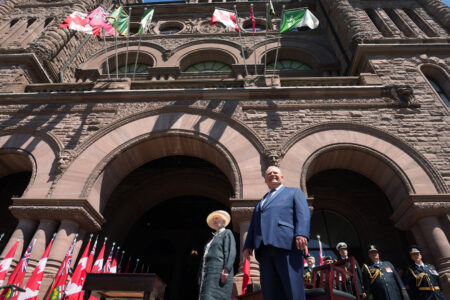
February 2022 will enter the Canadian history books as the month when the downtowns of Ottawa, several provincial capitals and critical border crossings into the United States were paralyzed by demonstrations. Announced as a movement against mandatory COVID-19 vaccinations for cross-border haulers, it was soon evident that some of the demonstrators had more on their minds. As the credible media reported, under the rallying word “freedom” the demonstrators put forth a quixotic assortment of social, economic and political demands. None of these was remotely consistent with the principles of Canadian government and governance.
With the demonstrations mostly over for now, the attention of officials and experts will rightly turn to the political, economic and security implications of the protests and how to prevent similar disruptive events from reoccurring. Unfortunately, this assessment will likely miss the root cause of the demonstrations: the failure of the education system to instill in youth basic notions of civics, citizenship and critical thinking skills that are essential to be a full participant in a liberal democracy.
Recent research on K-12 and post-secondary citizenship and civic education programs in Canada and Europe and my own longstanding role teaching politics in higher education show the critical role of citizenship education to foster and consolidate the shared principles and values that are fundamental to an inclusive, equal and diverse society.
Civic education in Canada
Concerns about the lack of civic literacy among the population, and in particular youth, are not new. For example, in 2019 the Samara Centre for Democracy reported on how the lack of civic literacy among some segments of Canadian society is undermining the foundation of our democracy. The centre points to both a lack of civic knowledge and awareness, and a diminished capacity to critically assess information conveyed through social media, as two of the root causes behind the lack of civic literacy. Fast-forward to 2022, and the centre’s report seems uncannily prescient. It could be argued that we are in the presence of an echo chamber where the lack of civic knowledge enables misinformation to take root, which in turn further undermines civic literacy. At its extreme, traditional political participation is diminished as democratic institutions and processes are seen as illegitimate.
Three deep-seated drivers of the convoy, and what we can do about them
The basic tenet of citizenship education is that citizens must develop a core set of civic knowledge, skills and values for them to participate in civic affairs. Though they vary across jurisdictions, school-based citizenship education curricula enable youth to acquire knowledge about national history, political facts and social issues; obtain the skills to participate in the political system and civil society; and instil the values and attitudes of democratic citizenship.
Consistent with the division of powers, citizenship education is principally the purview of the provinces. At the provincial level, the curricula and approach to citizenship engagement vary from province to province. In Ontario, for example, citizenship education is part of the social studies curriculum in grades 1 to 6 and world studies in grades 9 and 10. In Quebec, citizenship education is primarily delivered at the secondary level as part of the curriculum on citizenship education and history.
The federal government is also present and plays a significant role due to its responsibility for citizenship and immigration and federal elections. NGOs like Civix also play a significant part in providing information about citizenship and building citizenship competencies in Canada.
Troubling signs of civic unawareness on the demonstrators’ signs
As the demonstrators gathered in Ottawa and across Canada, I was immediately seized by how the demands made by the demonstration leaders showed a complete lack of civic literacy and awareness of how governance occurs in a liberal democracy. Let me consider just two of the many demands made by convoy factions as reported by the Ottawa Citizen:
- Ending all pandemic-related public health measures
- Replacing Canada’s elected government with a Unity Committee of the Senate and Governor General
The former highlights a misunderstanding of the division of powers and the latter of Canada’s system of government, democracy and responsible government. These are not concepts known only to political scientists and constitutional lawyers; these are the foundations of Canadian governance that have existed since 1867.
Recent studies have shown that Canadians remain less politically polarized than Americans and are generally satisfied with their governance. However, the recent protests should remind us about the imprudence of underestimating how the combination of individual lack of civic literacy and the magnification of misinformation through social media can, in time, become detrimental to democracy in Canada.
Therefore, though the problem of lack of civic literacy and its sources is well known and well understood, the approach taken in response is disaggregated and decentralized and framed by institutional and jurisdictional priorities, goals and objectives. Given what is at stake, it may be time to rethink this approach, within the responsibilities of current actors.
What is to be done? Lessons from Europe
Unlike almost every OECD country, Canada does not have a national ministry responsible for education. This should not be a reason for inaction about the need to enhance citizenship education programs across Canada. National action is not only possible – it is urgently needed. To those who object that the division of powers among 13 jurisdictions makes attaining this goal difficult, the example of the 27-member European Union suggests otherwise.
In March 2015, EU members convened in Paris to ratify the Declaration on promoting citizenship and the common values of freedom, tolerance and non-discrimination, as Europe’s call to action to “reinforce the role of education in promoting citizenship and the common values” across the EU. This initiative followed terrorist incidents that drew attention to the declining trust in democratic institutions, socio-economic problems and violent extremism. The declaration recognizes national jurisdiction in education policy while setting out common objectives for EU members and a commitment to sharing ideas and best practices. In effect, the declaration reaffirms the importance of embedding citizenship education within the core curriculum. A short report was subsequently prepared by the European Commission to take stock of developments flowing from the declaration.
So-called “Freedom Convoy” is a symptom of a deeply unequal society
In Canada, the Canadian Council of Ministers of Education is ideally placed to lead a similar initiative. In doing so, the idea is not to prescribe a curriculum, but rather to ensure that provinces and territories give due attention to this critical aspect of education policy.
In 2014, People for Education, a Canadian independent and non-partisan organization advocating for public education, observed that the making of an engaged and active citizen rests on a foundation of citizenship knowledge, skills and attitudes. In its 2014 report, People for Education noted that little was known about the level of civic competency of Canadian studies and citizenship education practices in Canadian schools.
The demonstrations of February show that we cannot remain complacent about the lack of civic competency among Canadians, and especially youth. As the Samara Centre for Democracy observed in 2019, “Our civic literacy deficit is not a new problem, but there is new urgency to fix it.” If we have learned anything from the past two years, it is that only the collective action of stakeholders across jurisdictions and sectors can ensure that we give Canadians the foundation required to be full participants in our democracy and governance.











